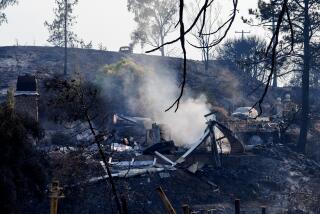Director of state toxics agency to step down
The head of the California Department of Toxic Substances Control is resigning after three years leading the long troubled department.
Debbie Raphael, who took over as director of the state agency in 2011, grappled publicly with reforming a department that was often ineffectual and glacially slow. Critics said Thursday that the agency had improved under Raphael’s leadership but needed more reform.
The department was the subject of a series of Times stories last year reporting deep flaws in the agency’s oversight of hazardous waste operations and its slow response to urgent problems. In one case, a battery recycler in Vernon accused of endangering more than 100,000 people with its arsenic emissions had been allowed to operate without a full permit for years.
Earlier this year, officials announced they had found elevated levels of lead in the soil at homes near the Exide Technologies plant. The plant is now closed temporarily.
Raphael, who will step down at the end of May to lead San Francisco’s Department of the Environment, faced an angry crowd of residents in Boyle Heights last year over the department’s failures to regulate the plant.
She said Thursday that the department is now “a fundamentally different place than when I started.” She said she has emphasized transparency, accountability and consumer products safety and moved to recover millions in uncollected money from companies to pay for cleaning contaminated land. The department is ramping up its environmental enforcement and has the beginnings of a new hazardous waste tracking system, she said.
“The momentum is building,” she said. “I am confident that the changes I have started are going to continue on after I leave.”
Created two decades ago, the department strives to protect people and the environment from the harmful effects of toxic substances. With more than 900 employees and a $200-million annual budget, the department is charged with enforcing hazardous waste laws, encouraging companies to manufacture chemically safer products and reducing the amount of hazardous waste generated.
Jane Williams, the executive director of California Communities Against Toxics, praised Raphael’s work at the department, saying she had “turned over a bunch of the rocks and hopefully started a new culture.”
But Williams said she believes the department is a long way from being fixed, and that Raphael’s replacement would need “a whip, a hard hat, steel-toed boots and a flak jacket to get anything done.”
State Sen. Kevin de León (D-Los Angeles) issued a statement saying: “The departure of such a highly-qualified leader as Debbie Raphael indicates to me that DTSC may be beyond repair. After repeated failures of the Department to protect the public’s health and safety, it’s time for a major restructuring of DTSC.”
In San Francisco, where she had worked for 12 years directing its Toxics Reduction and Green Building programs, Raphael will oversee a much smaller municipal department of about 115 employees and a $20-million annual budget. The post, however, is responsible for managing a wider range of environmental issues, including climate change, recycling and energy efficiency.
The appointment by San Francisco Mayor Ed Lee followed a three-month, nationwide search. In her new position, Raphael will earn an annual salary of $169,650, a pay increase of about $20,000, a state spokeswoman said.







